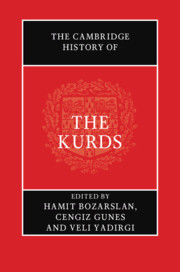Book contents
- The Cambridge History of the Kurds
- The Cambridge History of the Kurds
- Copyright page
- Contents
- Figures
- Maps
- Tables
- Contributors
- Acknowledgements
- Abbreviations
- Additional material
- Introduction
- Part I Historical Legacies
- Part II Regional Political Developments and the Kurds in the Twentieth and Twenty-First Centuries
- 7 Kurds and Kurdish Nationalism in the Interwar Period
- 8 From Tribal Chiefs to Marxist Activists
- 9 Kurdish Politics across the Middle East during the 1970s
- 10 Dark Times
- 11 Kurds in a New Century
- Part III Domestic Political Developments and the Kurds in the Twentieth and Twenty-First Centuries
- Part IV Religion and Society
- Part V Kurdish Language
- Part VI Art, Culture and Literature
- Part VII Transversal Dynamics
- Index
- References
9 - Kurdish Politics across the Middle East during the 1970s
from Part II - Regional Political Developments and the Kurds in the Twentieth and Twenty-First Centuries
Published online by Cambridge University Press: 13 April 2021
- The Cambridge History of the Kurds
- The Cambridge History of the Kurds
- Copyright page
- Contents
- Figures
- Maps
- Tables
- Contributors
- Acknowledgements
- Abbreviations
- Additional material
- Introduction
- Part I Historical Legacies
- Part II Regional Political Developments and the Kurds in the Twentieth and Twenty-First Centuries
- 7 Kurds and Kurdish Nationalism in the Interwar Period
- 8 From Tribal Chiefs to Marxist Activists
- 9 Kurdish Politics across the Middle East during the 1970s
- 10 Dark Times
- 11 Kurds in a New Century
- Part III Domestic Political Developments and the Kurds in the Twentieth and Twenty-First Centuries
- Part IV Religion and Society
- Part V Kurdish Language
- Part VI Art, Culture and Literature
- Part VII Transversal Dynamics
- Index
- References
Summary
“This chapter focuses on the political developments in the Kurdish regions of the Middle East during the 1970s, which was a pivotal period for the Kurds in a number of respects. The defeat of Kurdish armed struggle there in March 1975 marked the beginning of the fragmentation of the Iraqi Kurdish movement. In this period, Kurdish conflicts in the region became integrated into the regional power struggles and created the possibility of alliances, but as the experience of the Kurdish movement in Iraq demonstrated, the Kurds could not rely on these alliances as the empowerment of the Kurds was not the objective. In Turkey, after years of silence, Kurdish activists began organizing cultural and political activities and challenged Kurds’ oppression and denial of their identity. In Iran, too, the Kurdish movement was highly active and after the overthrow of the shah’s regime, it mobilized a significant section of Kurdish society around the demand of territorial autonomy. In Syria, despite the existence of Kurdish political organization, the consolidation of the authoritarian regime in Syria following Hafez al-Assad’s ascendency to power further limited the opportunities for Syria’s Kurdish movement.”
Keywords
- Type
- Chapter
- Information
- The Cambridge History of the Kurds , pp. 250 - 268Publisher: Cambridge University PressPrint publication year: 2021

